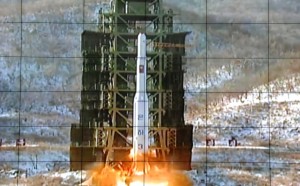- California Assembly OKs highest minimum wage in nation
- S. Korea unveils first graphic cigarette warnings
- US joins with South Korea, Japan in bid to deter North Korea
- LPGA golfer Chun In-gee finally back in action
- S. Korea won’t be top seed in final World Cup qualification round
- US men’s soccer misses 2nd straight Olympics
- US back on track in qualifying with 4-0 win over Guatemala
- High-intensity workout injuries spawn cottage industry
- CDC expands range of Zika mosquitoes into parts of Northeast
- Who knew? ‘The Walking Dead’ is helping families connect
S. Korea, US, Japan unite against N. Korea’s weapons tests

This December 2012 photo, released by North Korea’s official Korean Central News Agency, shows North Korea’s Unha-3 rocket being fired from the Sohae Satellite Launching Station in Cholsan, North Pyongan Province. North Korea said on Sept. 14, 2015, that it plans to launch a rocket at a time of its choosing as it has the right to conduct space research, cementing speculation over a provocation by the country around Oct. 10, the 70th anniversary of the founding of the Workers’ Party. (Yonhap)
By Brian Han
Even though North Korea’s latest weapons test resulted in a submarine missile launch that failed to leave the water, other countries still recognize the potential of a threat.
That’s why the nuclear envoys from South Korea, the U.S. and Japan announced renewed efforts to prevent future weapons development initiatives by the communist country.
U.S. Ambassador Sung Kim met on Thursday with South Korea’s representative for Korean Peninsula peace and security affairs Hwang Joon-kook and Japan’s director-general at Japan’s Foreign Ministry Kimihiro Ishikane.
For months, discussions circulating around the issue seemed to end with the acknowledgement of the issue regarding North Korea’s weapons development program yet never seemed to turn into concrete solutions.
This time around, the three representatives hope to send United Nations nuclear inspectors within the North’s borders for a more thorough investigation.
“We shared an understanding that the international community should send a strong message to deter strategic provocations like SLBM (tests) or satellite launches,” Hwang said to reporters according to Yonhap News. “We also agreed to continue to work together to carry out Security Council resolutions earnestly and to improve the effectiveness of Security Council sanctions.”
U.S. representative Kim urged North Korea to halt its weapons development efforts on its own, while “making good on its own commitments to denuclearization.”
















